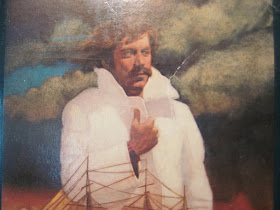"My solid marine madness": W.S. Merwin's translation of Neruda's "el solido frenesi marino" is a phrase that speaks to me, that calls for me. Riptides of the soul; passion's relentless currents. What did T.S. Eliot offer in this regard? Something about Phlebas, "As he rose and fell / He passed the stages of his age and youth / Entering the whirlpool"--and "Consider Phlebas, who was once as handsome and tall as you." Or, to shift to a beloved passage from Shakespeare's Tempest: "full fathoms five / thy father lies."
Water--whether held in check or fiercely flowing, the undersea realm, anything marine-- means mortal transformation, means death for most poets, but not for Homer, and not for Neruda.
Pablo Neruda is offering a more immediate drama of "marine madness," of aquatic passion that is suffered and that transcends. Neruda puts us into the midst of the sea-change, first keeps us in the curl of the wave and then within the first two fathoms or so of the surface, though there's plenty of depth here.
In the third stanza below, I see the surfer, though Neruda most likely had a swimmer in mind, though in the earlier stanzas the speaker could be a sailor or, more likely, a passenger on a boat. In this third stanza, I see this body-surfer riding the wave in a mix of frustration and ecstasy-- "mounted" and then "becalmed"--and ending with that lovely, haunting phrase: "in the throat of the fortunate isles / that are white and sweet as cool hips"; "en las garganta de las afortunadas / islas blancas y dulces como caderas frescas."
"Drunk with Pines" is the ninth poem in Viente Poemas de Amor y una Cancion Desesperada from 1924, when Neruda was only twenty years old. I've commented in the previous blog entry about Neruda's passion and poetics. His imagery can be both strikingly clear and paradoxical, evocative and mysterious. (I'll admit I don't always understand certain phrases, certain lines --or at least not yet-- but I don't find that uncertainty the obstacle it would be with other poets.) In particular, the depth of longing that informs the vivid imagery makes this volume a particular favorite for so many people.
Here, I want to share the ninth poem in both Neruda's original Spanish and W.S. Merwin's English translation. As I've said before, I have mostly lost my high school level Spanish, though with my rusty Latin, a dictionary, and a translation alongside, I do enjoy working my way through Neruda's original poetry, reading aloud as best I can to hear the music, the considerable music, of this Chilean poet.
And, that final image of the paired swimmers, "quick and slow, in the energy under the sky" -- "rapido y lento en la energia subceleste."
IX. Ebrio De Trementina
Ebrio de trementina y largos besos,
estival, el velero de las roasas dirijo,
torcido hacia la muerte del delgado dia,
cimentado en el solido frenesi marino.
Palido y amarrado a mi agua devorante
cruzo en el agrio olor del clima descrubierto,
aun vestido de gris y sonidos amargos,
y una cimera triste de abandonada espuma.
Voy, duro de pasiones, montado en mi ola unica,
lunar, solar, ardiente y frio, repentino,
dormido en la garganta de las afortunadas
islas blancas y dulces como caderas frescas.
Tiembla en la noche humeda mi vestido de besos
locamente cargado de electricas gestiones,
de modo heroico dividido en suenos
y embriagadoras rosas practicandose en mi.
Aguas arribe, en medio de las olas externas,
tu paralelo cuerpo se sujeta en mis brazos
como un pez infinitamente pegado a mi alma
rapido y lento en la energia subceleste.
IX. Drunk with Pines
Drunk with pines and long kisses,
like summer I steer the fast sail of the roses,
bent towards the death of the thin day,
stuck into my solid marine madness.
Pale and lashed to my ravenous water,
I cruise in the sour smell of the naked climate,
still dressed in grey and bitter sounds
and a sad crest of abandoned spray.
Hardened by passions, I go mounted on my one wave,
lunar, solar, burning and cold, all at once,
becalmed in the throat of the fortunate isles
that are white and sweet as cool hips.
In the moist night my garment of kisses trembles
charged to insanity with electric currents,
heroically divided into dreams
and intoxicating roses practising on me.
Upstream, in the midst of the outer waves,
your parallel body yields to my arms
like a fish infinitely fastened to my soul,
quick and slow, in the energy under the sky.
Neruda, Pablo. Twenty Love Poems and a Song of Despair. W.S. Merwin, trans. New York: Penguin. 1978
































